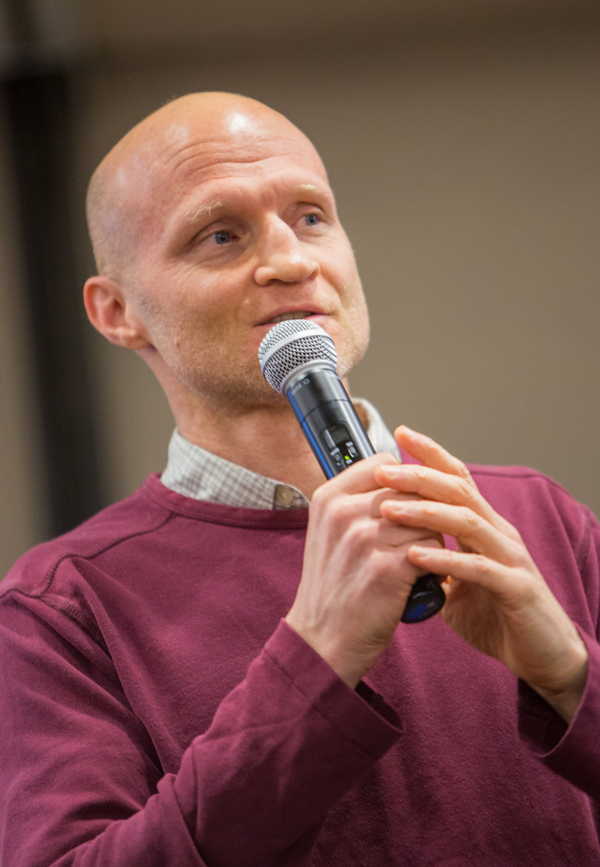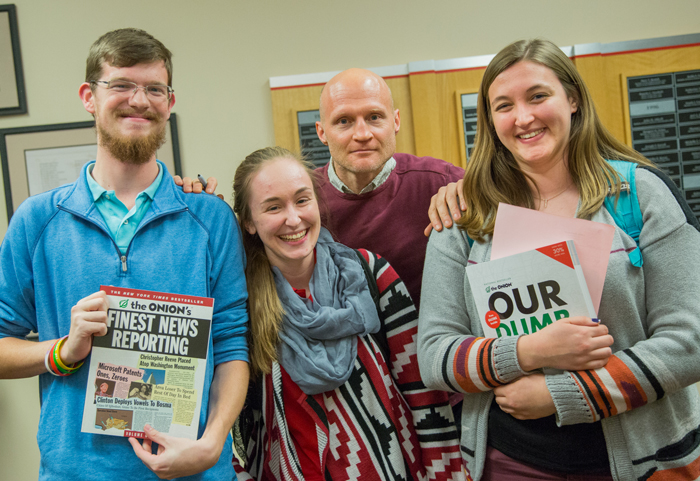
Scott Dikkers, founder of The Onion, followed up his Nov. 12 talk at UMSL with an extensive question-and-answer session that touched on everything from the role of humor in the wake of tragedy to his own favorite Onion stories. (Photos by Rebecca Barr)
Its headlines have resulted in countless fits of laughter as well as outrage for many years now, from 2007’s “Exercise Ball All The Way Over There” to this week’s “Congress Members Spend Afternoon Drawing Pictures Of Their Dream Capitols.” But the true story behind The Onion’s perpetually outrageous articles is itself a funny one, as a large crowd at the University of Missouri–St. Louis learned last Thursday evening.
Visiting UMSL Nov. 12 as part of the Student Life Speaker Series, the satirical outlet’s founding editor, Scott Dikkers, kept students and community members in stitches for an hour and a half during his 7:30 p.m. presentation in the Millennium Student Center.

While on campus for his Student Life Speaker Series presentation last Thursday, Scott Dikkers also conducted a workshop with creative-writing students, offering insight into what makes humorous writing work.
Dikkers’ description of the motley and vastly underpaid crew of misfits who helped fill The Onion’s pages during its early years in Madison, Wis., drew some of the loudest laughter from the audience. So did his anecdotes about eliciting the ire of public figures and corporations over the years. Giving a Frito-Lay story from the ’90s as one of several examples of the publication making powerful parties apoplectic, Dikkers noted that such high-profile complaints have become less frequent as The Onion has grown in popularity.
“Now we write that same story, and they send us a box of chips,” Dikkers said.
Looking back even further than The Onion’s founding year of 1988, Dikkers shared memories of how humor became a coping mechanism for him as an adolescent – and eventually something he was intent on making a living at.
“I was born into a family that didn’t have a sense of humor,” Dikkers said. “I don’t recall a lot of laughter in my childhood.” Soon enough, though, he discovered MAD Magazine, which he credits with having a significant impact on his perspective.
“Here was a publication available at my corner newsstand that made fun of everything,” he said. “I didn’t know you could do that … I realized [humor] was a way to find meaning in life.”
Dikkers created a comic strip, Jim’s Journal, as a teenager that won first place in a statewide high school journalism contest. Then, for a long time, he submitted it to syndicates, receiving rejection after rejection.
“For years I did this,” Dikkers said, adding that he got a job at McDonald’s in the meantime. But he kept at it with the comic, and finally a small newspaper decided to take it on.
“They decided to run it on a trial basis for no pay,” he said. “And I was ecstatic.” That turned into $5 per week, and Dikkers started selling T-shirts featuring Jim’s Journal and eventually self-published a book that made the national bestseller list.

UMSL students (from left) Bennett Felton, Kaitlin Henning and Briana Robertson pose with Scott Dikkers after securing signed copies of his books. Of his forthcoming satirical volume on presidential candidate Donald Trump, Dikkers said, “Part of my marketing strategy is getting him angry.”
But it took quite a few years to turn much of a profit with his creative endeavors, as Dikkers pointed out in response to a question from UMSL sophomore Daisha Smith. When she asked for his advice on balancing academic pursuits with the desire to devote more time and energy to writing, he suggested being realistic about what’s feasible. He noted that even when The Onion began to grow by leaps and bounds and he and his partner began to pay their writers more than a token amount, his own financial footing remained shaky.
At times he relied on friends and, at one point, while volunteering with Big Brothers Big Sisters, on the kindness of his little brother’s family for a place to rest his head at night.
“They had a mattress by this furnace in their unfinished basement that they let me sleep on,” he said, adding that although it was a challenging time in his life, he was happy, because he was doing what he really wanted to be doing.
Near the end of his talk, Dikkers offered five principles of creative leadership: 1. Live your mission. 2. Invest your passion, not your money. 3. Be prepared to scrap everything and take it as a learning experience if it doesn’t get traction. 4. Trust your people. 5. Don’t work hard, don’t work smart – work right.
Earlier in the day, Dikkers also led an informal discussion with a handful of UMSL students who are pursuing creative writing.
“I enjoyed seeing two sides of him,” said Dan Musgrave, a fiction student in the MFA in Creative Writing program. “In the workshop, we got the editor of a successful publication, who was serious and knowledgeable … He was analytical and able to parse humor in ways that I hadn’t even considered before. But during his bigger talk, we got the comedian who could work a room. I appreciated that contrast.”
Both Musgrave and senior English major Amber Scholl, who also attended the workshop and speaking event, were struck by how much work goes into one successful Onion story – and the hundreds of headline possibilities each week that don’t make the cut.
“Reading something like The Onion makes writing look easy, but talking to him, it’s clear how much work, deliberation, and trial and error go into it,” Scholl said, adding that she appreciated what Dikkers said about everyone being “born with a lot to say.”
“One of his biggest pieces of advice was to sit down and write for half an hour every day,” she said. “Sometimes even this can be difficult, but as he said, if you want to create something bad enough, you’ll make it happen.”
After answering dozens of questions from the audience following his talk, Dikkers signed books, including his “How To Write Funny” guide, which outlines what he considers the 11 types of humor and foolproof writing exercises. UMSL students and community members snapped up all of the copies on hand for the event.
Senior advertising student Evan Miguel came away with more resolve to follow his own chosen career path, whatever challenges arise along the way.
“It inspires me to do my best work and to really just do what I love and put my passion in it,” he said.















